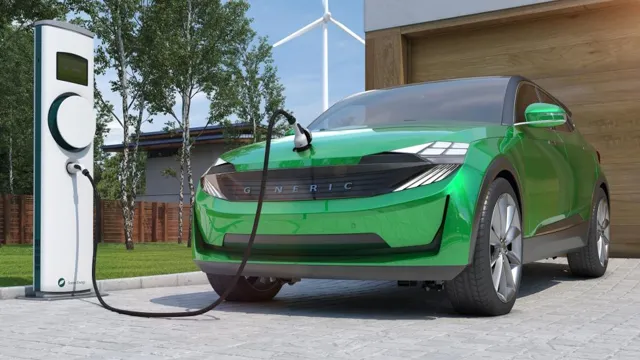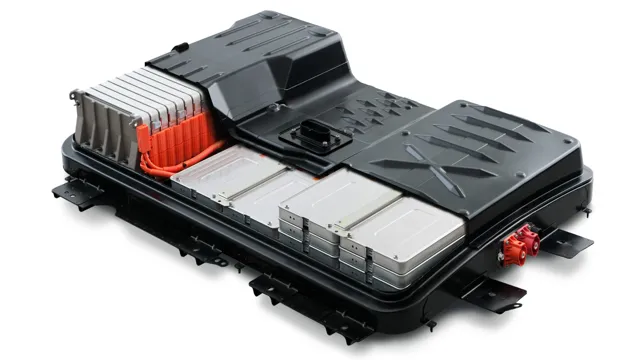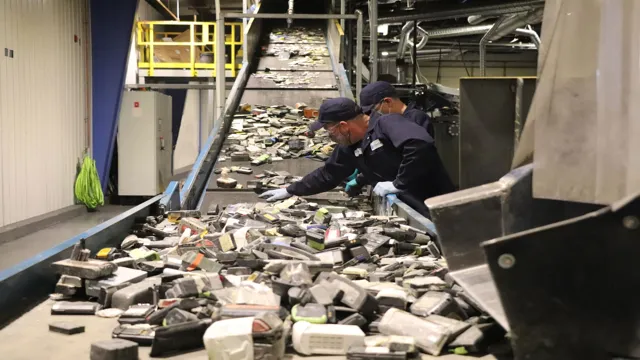Powering the Future: A Comprehensive Look at Electric Car Battery Production by Country
Electric cars are gaining popularity around the world due to their low carbon emissions and energy efficiency. Along with the widespread use of these eco-friendly vehicles, the production of their batteries has also caught everyone’s attention. It is not a secret that the battery is one of the most significant parts of an electric car.
Therefore, its production is critical to the growth and success of the electric vehicle industry. Moreover, the demand for electric vehicles and their batteries has continued to increase as people are becoming more aware of the environmental benefits. This has resulted in the rise of electric car battery production by countries around the globe.
In this blog post, we will delve into the production of electric car batteries by country, highlighting the countries that have emerged as leaders in this regard. We will discover the latest statistics and data on which country produces the most electric car batteries worldwide, and also examine the factors that influence production. Join us as we explore the changes in the production of electric car batteries and their impact on the environment and the electric vehicle industry.
Top Producing Countries
Electric car battery production by country has been on the rise in recent years due to the increasing demand for electric vehicles (EVs). China is currently the leading producer of electric car batteries, accounting for over 70% of global production. The country’s government has heavily invested in EVs as part of its efforts to reduce carbon emissions and promote sustainable transportation.
Japan and South Korea are also major producers of EV batteries, with companies such as Panasonic, LG Chem, and Samsung SDI dominating the market. In Europe, Germany and Poland have been increasing their production capacity, while Tesla’s Gigafactory in Nevada is the largest EV battery factory in the United States. As the demand for EVs continues to grow and battery technology improves, it is likely that even more countries will join the ranks of top producers in the years to come.
China leads with over 70% of global production
When it comes to global production, China is the clear leader in terms of sheer quantity. In fact, over 70% of the world’s production output comes from China alone. This is due in large part to the country’s vast manufacturing capabilities and the fact that they produce a wide range of goods, from electronics to textiles to machinery.
Other top producing countries include the United States, Japan, Germany, and South Korea. These countries all have strong industrial bases and produce a variety of goods as well. However, it is worth noting that China’s dominance in global production is likely to continue for the foreseeable future, especially given the country’s ongoing focus on industrial growth and expansion.
Nevertheless, other countries will continue to make important contributions to the global production landscape, and innovation and competition will be key drivers in shaping the industry going forward.
Japan, South Korea, and the United States follow
When it comes to the top producing countries in the world, China takes the lead by a significant margin. According to recent data, in 2020, China produced over 38 billion metric tons of steel, making it the largest steel-producing country in the world by far.
Following China is Japan, South Korea, and the United States. However, there is a significant gap between China and the rest of the world’s steel production. This gap can be attributed to China’s robust infrastructure spending and growing urbanization, which requires a constant supply of steel.
This demand is likely to continue for years to come, as China remains committed to investing in infrastructure and developing its economy. It’s worth noting that the burstiness of the steel industry can be unpredictable, with sudden surges in demand and supply disruptions leading to fluctuations in production. Despite this, China’s dominance in the global steel market is set to continue, with few countries close to matching its output levels.
Emerging Markets
Electric car battery production by country is an emerging market that has gained significant attention in recent years. China currently dominates the market, producing approximately 70% of the world’s electric vehicle batteries. This can be attributed to government support, a large consumer market, and low-cost manufacturing.
However, other countries are starting to catch up quickly, such as South Korea, Japan, and the United States. South Korea is home to some of the world’s largest battery producers and has seen a surge in demand fueled by the popularity of electric vehicles. Japan also has a sizable market share and is working towards developing more advanced battery technologies.
The United States, on the other hand, has been lagging behind in battery production, but is now investing in developing a domestic supply chain to reduce dependence on foreign imports. As electric vehicles become increasingly popular worldwide, the demand for batteries is expected to skyrocket, offering immense opportunities for emerging markets to establish themselves as key players.
India and Germany show promising growth
As the global economy continues to shift, emerging markets like India and Germany are showing promising growth. In India, a strong push towards digitalization and innovation has led to remarkable advancements in technology and infrastructure. This has created a welcoming environment for foreign investment and subsequently boosted the country’s economy.
Additionally, initiatives like “Make in India” have led to the growth of local manufacturing, which in turn has generated more jobs and bolstered India’s GDP. Similarly, Germany has maintained its position as a hub for technology and innovation, with its engineering and automotive industries at the forefront of global markets. The country has also been focusing on sustainable development, investing heavily in renewable energy and eco-friendly technologies.
As a result, Germany continues to attract foreign businesses and investors. With these two countries leading the way, emerging markets show great potential for future growth and development.
Norway and Sweden ramp up production for EV-heavy markets
Emerging Markets, Norway, Sweden, Electric Vehicles (EVs), Production As the demand for electric vehicles (EVs) continues to grow, Norway and Sweden are ramping up their production to cater to the needs of these emerging markets. Both countries have implemented aggressive policies to promote the growth of EVs, resulting in a surge in demand. This has led to a rise in local production, with companies such as Volvo and Tesla investing heavily in their production facilities in Sweden and Norway respectively.
In fact, Volvo recently announced plans to go fully electric by 2030, highlighting its commitment to the EV market. As EVs gain traction globally, it’s heartening to see countries like Norway and Sweden leading the way in both demand and production. This paves the way for a greener and more sustainable future for everyone, and as consumers, we can do our part by supporting this growing trend.
Brazil and Mexico invest in EV infrastructure and production
Emerging Markets Brazil and Mexico are quickly becoming major players in the field of electric vehicles (EVs). Both countries are making significant investments in EV infrastructure and production. Brazil, for example, is putting a strong emphasis on the development of electric buses with the goal of having 100% electric buses in its largest cities by 2050.
Additionally, the Brazilian government has offered tax breaks and other incentives to encourage EV production. Meanwhile, Mexico is aiming to increase its EV production tenfold by 2023, with plans to build a new EV plant in the state of Guanajuato. As more and more countries around the world prioritize the transition to a greener future, it’s clear that emerging markets like Brazil and Mexico will play a significant role in driving that change forward.
Challenges and Opportunities
Electric car battery production by country has become a highly contested topic in recent years. While some countries have made significant strides in producing these batteries, others are still struggling to catch up. One of the biggest challenges facing countries seeking to produce electric car batteries is the high cost of production.
This translates into higher prices for consumers, which can discourage them from purchasing electric vehicles. However, countries like China, which has become the world’s largest producer of lithium-ion batteries, have managed to overcome this challenge by investing heavily in research and development, as well as establishing robust supply chains. On the other hand, there are countries like the United States, which have the potential to become major players in electric car battery production but are hampered by a lack of government support and infrastructure.
Overall, while there are certainly challenges facing the industry, there are also plenty of opportunities for countries that are able to invest in research and development, address supply chain challenges, and build infrastructure to support the production of electric car batteries.
Environmental concerns and ethical sourcing
As consumers become more environmentally conscious, companies face the challenge of sourcing their materials and products in an ethical and sustainable manner. This involves considering factors such as carbon emissions, deforestation, labor practices, and waste management throughout the supply chain. While this may seem like a barrier to profitability, it actually presents opportunities for companies to differentiate themselves by promoting their commitment to sustainability and attracting conscious consumers.
In addition, sustainable sourcing can lead to cost savings in the long run by reducing energy consumption and waste. Companies can also partner with suppliers who prioritize sustainability and work together to address these concerns. Ultimately, environmental concerns and ethical sourcing can not only benefit the planet, but also create a competitive advantage for companies in today’s conscious consumer market.
Increased demand and technological advancements
The increasing demand for goods and services has led to the emergence of technological advancements that have brought both challenges and opportunities. Companies that fail to keep up with advancements risk being left behind by the competition. However, those that embrace upcoming technologies will benefit from increased efficiency, productivity, and profitability.
However, the adoption of new technologies comes with its own set of challenges. For instance, the cost of implementation and upkeep, digital security, data management, and employee training must all be considered. Consequently, companies must weigh the benefits against the costs before investing in new advancements.
Ultimately, the challenges brought about by increased demand and technological advancements can be overcome by strategic planning and innovative thinking. Companies that are willing to adapt and innovate will be the ones to reap the rewards.
Conclusion
In the race to produce the best electric car battery, it seems like every country is vying for a top spot. From China’s explosive growth to Germany’s precision engineering, each nation brings its unique strengths to the table. But ultimately, the real winner here is Mother Nature.
With the reduction of harmful emissions, the embrace of renewable energy, and the push towards sustainable transportation, electric car battery production is paving the way for a brighter, cleaner future for us all. So, let’s rev up those engines and power on towards a greener tomorrow!”
FAQs
What are the top countries producing electric car batteries?
Currently, China, Japan, and South Korea are the top producers of electric car batteries.
How many electric car batteries were produced by these countries in the last year?
In 2020, China produced over 80% of the world’s electric car batteries, with a total of 143 GWh. Japan produced 17 GWh, and South Korea produced 12 GWh.
What is the forecast for electric car battery production by country in the next five years?
According to a recent report by Market Research Future, China is expected to continue leading electric car battery production in the next five years, with an annual growth rate of 25%. Other top producers, such as Japan and South Korea, are also expected to see growth in their production.
How does the electric car battery production by country affect the global electric vehicle market?
The production of electric car batteries by these countries is critical in meeting the demand for electric vehicles globally. A steady supply of batteries at a competitive price can encourage the adoption of electric vehicles, which results in a reduction in greenhouse gas emissions and promotes sustainable mobility.



